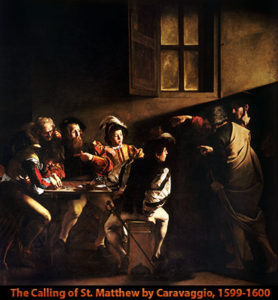He went out again beside the sea, and all the crowd was coming to him, and he was teaching them. And as he passed by, he saw Levi the son of Alphaeus sitting at the tax booth, and he said to him, “Follow me.” And he rose and followed him.
And as he reclined at table in his house, many tax collectors and sinners were reclining with Jesus and his disciples, for there were many who followed him. And the scribes of the Pharisees, when they saw that he was eating with sinners and tax collectors, said to his disciples, “Why does he eat with tax collectors and sinners?” And when Jesus heard it, he said to them, “Those who are well have no need of a physician, but those who are sick. I came not to call the righteous, but sinners.” – Mark 2:13-17
What is Levi doing at a tax booth in Capernaum by the Sea of Galilee? That seems odd, doesn’t it? You would need to understand who was in power to figure out what Levi was doing there. Herod the Great, who died in 4BC, willed divided parts of Israel to three of his children. Archelaus inherited Judea in the south, Philip received the Golan Heights, extending up into Syria, Antipas got Galilee in the north with the Jordan as the border between his and Philips’ territory. Capernaum is where the Jordan meets the Sea in the north, so it is the town between the two territories. Just as you pay an airport tax today, and perhaps a toll to travel between countries, so that’s the way it was between these two territories; Levi has a toll booth, and he’s the toll collector.
Anyone working to collect tolls or taxes from the Jews is going to be hated, but particularly if it’s a Jew doing the collecting. Chances are that Levi is used to being hated and socially mistreated. Then one day Jesus came by without a shout or swear or insult and said something unimaginable: “Follow me.” While we know that Jesus’ call to follow is always answered in the affirmative by the one called (salvation belongs to Him!), I suspect that at least this calling may have been a kind relief for Levi.
Scandalously, the man who was working for the one claiming to be the King of the Jews was called to work for the One who is actually the King of the Jews. But royal identity has to wait a bit. Instead, Jesus identifies Himself as a doctor rather than a king. Jesus goes with Levi from the toll booth at the sea to Levi’s house. And as he reclined at table in his house, many tax collectors and sinners were reclining with Jesus and his disciples, for there were many who followed him. And the scribes of the Pharisees, when they saw that he was eating with sinners and tax collectors, said to his disciples, “Why does he eat with tax collectors and sinners?”
The scribes of the Pharisees, that is to say, the lawyers, are appalled that bad people—people easily written off—are not only following Rabbi Jesus, but making a feast or party out of it. It’s not merely that Jesus had a few people over for dinner, but many are there for the festivities. This is outrageous in a world where Old Covenant shadows had been used to judge these outcasts and ignore them from then on.
But Jesus doesn’t mind challenging these critics to their face. “Those who are well have no need of a physician, but those who are sick. I came not to call the righteous, but sinners.” This is so monumental that I have to wonder if a bell rang out through the universe. The doctor is in! He is warning us to see things properly (from God’s point of view rather than by human partiality); He is encouraging us to extend His healing welcome (because we know we’re warmly welcomed too); He is showing us where to get the medicine we need (at His table). And that’s the gospel!
